In this post we will take you to Sri Lanka’s west coast and we will drive from Colombo to Kalpitiya. We are traveling by car, using the same road as buses.
First we will see Colombo’s sights and afterwards drive to Negombo to watch fishermen at work and fish drying on the ground. We will also see Negombo beaches.
Driving on from Negombo to Kalpitiya there will be rice fields and temples, and a lot of cows.
The Kalpitiya Peninsula is our destination, and a village with white-sand beaches on both sides. And coconut palms that they also use as house roofs. We stayed in a blue and white villa with a coconut roof, living partly outdoors and sleeping inside mosquito nets.
If this sounds great, join our trip!

Buddhas and urban development in a Colombo temple
How Did We Travel from Colombo to Kalpitiya?
We were touring Sri Lanka’s west coast with a car and a driver that we had for our whole Sri Lanka stay. If you want to know how we did all this, check out my post What to See in Sri Lanka,and How to Tour the Island.
The west coast is where we started our trip after landing in Colombo where the country’s main airport is. This is where most travelers arrive so this post will give you an idea on what you can do on your first Sri Lanka days.
The Colombo to Kalpitiya Drive on the Map
Sri Lanka’s west coast and the road from Colombo to Kalpitiya on the map
The map shows our 175 km drive from Colombo to Kalpitiya. In fact we started 6 km south of Colombo where our first night hotel was. I will show the hotel in this post. After seeing the places to visit in Colombo we first took the slower coastal road to Negombo and from Negombo on to the Kalpitiya Peninsula two hours further north.
Alternatively you can take the motorway straight to Negombo but I would say small roads are a lot more interesting. Driving through local villages that follow each other all the way from Kalpitiya to Negombo you will get the real touch of Sri Lanka.right away. And you will also get to know the extremely busy traffic so typical of Sri Lanka.

From Colombo to Kalpitiya: Sri Lanka West Coast traffic
Then after leaving Negombo you will dive into the countryside and see more open farmland. Coconut palms, pretty lakes and temples of all religions of Sri Lanka.
The Kalpitiya Peninsula again has a bit more villages – and a huge amount of cows on the road. I will show it.

Sri Lanka west coast traffic
What to See in Colombo

February 4, Sri Lanka’s National Day
Colombo was not really included in our travel itinerary but we asked our driver show us its main sights. No problem he said, but we had to start early to get there before the crowds.
It was Sunday and Sri Lanka’s National Day, February 4. The country was going to celebrate its 70 years independence after the British left the country in 1948 . For this reason all politicians and crowds of Sri Lankans were going to gather in Central Colombo later during the day.
So we set off from our hotel at 9 a.m. and this is what we saw in Central Colombo:

Independence Memorial Hall and statue of the first Sri Lanka Prime Minister
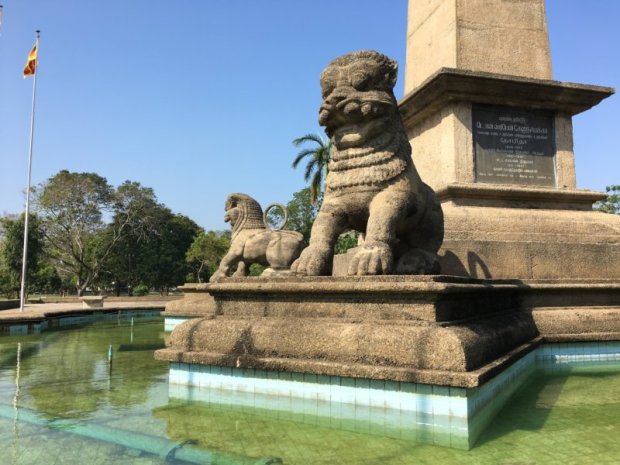
Massive stone lions around Prime Minister statue

No crowds yet but it will be!

Independence Memorial Hall
Apparently there were no Memorial Hall festivities yet so we left towards South Beira Lake in the city center. The lake is green and has a small island in the middle, and a beautiful Buddhist shrine.
South Beira Lake and Seema Malaka

Central Colombo: South Beira Lake
This is the Seema Malaka Buddhist temple, located on a small island but connected to the lakeshore by a walkway so getting there was super easy, we just paid a small fee and took off our shoes.
It’s a rule that you always enter Buddhist temples barefoot. That is not a problem – in the morning. But in the afternoon the sun heats the ground simply too hot to walk on. However after visiting a certain number of temples we got used to our soles burning and the hot ground almost felt good.

Seema Malaka and South Beira Lake
Seema Malaka has a lot of similar Buddha statues and most of them are golden, except these ones sitting outside and looking towards the city. The stone statues are really massive and there is a long row of them as well:

Seema Malaka stone Buddhas

Golden Buddhas in a row

A closer view of golden Buddhas

Buddhas and prayer ribbons
Like all Buddhist temples the temple island has a bo tree. Bo tree is what Buddha was sitting below when he got enlightenment in India and a first branch of the tree was imported to Sri Lanka. Here you can see a Buddha looking at his bo tree on the temple courtyard:

Seema Malaka Buddha and bo tree

Prayer ribbons hanging in a tree

Gate statue of Colombo temple island

Traditions and modern time meet in Colombo
Gangaramaya Temple
We sat down in the car and enjoyed air-conditioning. Driver Mac allowed us one more Colombo sight before driving on: the Buddhist Gangaramaya Temple almost next door to Seema Malaka. That was a really large temple complex on a shady side street, controversially right within the modern city.
What we first liked in the Gangaramaya temple complex were some small details like these wild courtyard flowers:

Gangaramaya Temple courtyard details
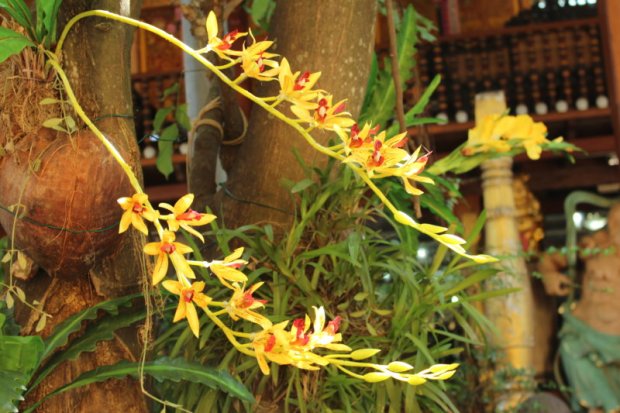
Temple flower growing in tree

Gangaramaya Temple inner courtyard and bo tree

Some more temple flowers
But what about the temple itself? Whoever planned it had been given free hands to mix Buddhist and Indian styles. Or what do you think about the wall decorations in the shrine’s main image house (see below)?

Entrance to the image house, Gangaramaya Temple
Inside the image house we found walls filled with artwork, both wood carvings and paintings and the painter had not saved the least in using all colors:

Wall carvings in image house

Orange-colored Buddha

Another image house statue
A couple of photos on the exterior that, too, is ornamental:

Exterior decoration of Gangaramaya Temple

Gangaramaya Temple visitors and courtyard
It’s a custom that temples also include a temple elephant. In addition elephant tusks are used as decorative elements:

Buddhas and elephant tusks

Buddhas without elephant tusks
One more temple highlight was this collection of Buddha statues and small dagobas, all in stone:

Stone Buddhas and dagobas, Gangaramaya Temple
But we had to say goodbye to this modern city hidden temple and the statues. We picked our shoes and went on.

Gangaramaya temple plants and statue

Gangaramaya temple, Sri Lanka
More to See in Colombo
Sunday morning in Colombo was a relaxing experience but at most other times the city is crowded, noisy and chaotic. A lot of traffic and people rushing in all directions, markets, bazaars, trains, buses and tuk tuks packed with people.
Colombo is a mixture of cultures and building styles. First came the Muslims that built their trading port in Colombo, conveniently located along their east-west trading route, then came the Portuguese that added a fort and later on the British added a harbor. The Colmobo of today is the commercial capital of Sri Lanka and the political capital is the pretty unknown Sri Jayawardenepura Kotte located east of Colombo.
But what else is there to see in Colombo? There is the huge Viharamaha Devi Park with a shining Buddha statue:

Viharamaha Devi Park Buddha statue
And there is a new theater and concert hall that more looks like a stadium:

Colombo theater and concert hall
The old colonial town hall looks like the U.S. Capitol or White House, white and shining in the tropical sun:

Town Hall of Colombo
And above all, there are tuk tuks, red, green, black, everywhere and in all colors:

Colombo tuk tuks
And – since Colombo is gateway to Sri Lanka, there is a good choice of hotels. Most tourists stay here a night or two before going on an island tour or to West or South Coast tourist resorts.
Where to Stay in Colombo

Hotel Mirage Colombo, Sri Lanka
After landing we stayed our first night south of downtown Colombo. It was an ocean side hotel, Mirage Colombo, with an outdoor pool on the second floor, and a splendid ocean beach in front, yet behind a busy road and a railway line that were easy to cross.
As we arrived after sunset and left early morning we didn’t have any time to use the pool or the beach. We only dined, had our breakfast and slept away our sleepless night on the plane. The room was good and so was the buffet with both Sri Lankan and international dishes.
This hotel really made us feel at home, far away in Asia: the first people we met were a bus group of Norwegian travelers heading to a Sri Lanka tour. Their group leader told me about travel in Sri Lanka and explained local habits, all in clear Swedish!
You can find more information on our first Sri Lanka hotel on the Hotel Mirage Colombo website.
From Colombo to Kalpitiya: Negombo

Fishermen at work, Negombo Lagoon
Negombo is the north end of the tourist-oriented West Coast that in the south begins at Hikkaduwa. This coastal strip has hundreds of hotels along the sandy shoreline and is yet a living Sri Lankan area. In Negombo fishermen catch fish in the Indian Ocean and repair their nets on the sheltered lagoon. This man is one of them, working in the center of Negombo.
Negombo lagoon is what you first see when landing in Sri Lanka, the airport is just behind it. No wonder tourists choose to stay in Negombo, at least a night or two before heading inland to where the sights are. But these fishermen don’t care, they go on doing their work.

Negombo fisherman

Typical fishing-boat

Preparing for a fishing trip
Negombo village lies between the lagoon and the ocean. It looks like a very typical Sri Lankan village, except that there are the tourist stalls, hotels and souvenirs. Some views of the village:

Lagoon seen from Negombo village

From Colombo to Kalpitiya: Nebgombo main thoroughfare

Negombo traffic
Negombo Oceanside
On the ocean side Negombo has a huge fish market, normally busy but pretty empty on Sundays:

From Colombo to Kalpitiya: Negombo fish market
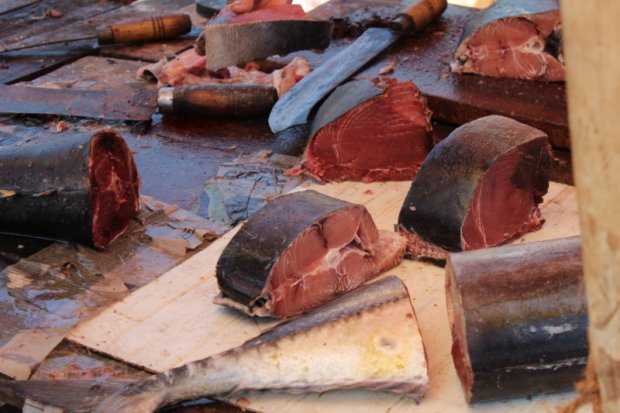
Fresh tuna fish

Fish market bustle

What about fresh shrimps?

Or a Pepsi?
Where does all this fish come from? The fishermen we saw on the lagoon side catch it in the Incian Ocean. They bring the fish to the hot sand dunes on the Ocean side where they dry it. They salt the fish and leave it in the strong sunlight for a couple of days.
These women are are busy sorting drying fish and turning the fish where needed.

Negombo fish market women at work

Neatly sorted drying fish

Almost dry!

From Colombo to Kalpitiya: fish drying in equator sunlight
Even if birds don’t take salted fish drying fish needs to be protected:

Drying fish in shelter
Seeing dried fish being prepared we started to feel hungry, but maybe no fish lunch today Instead we took the car again and went for a hotel lunch.
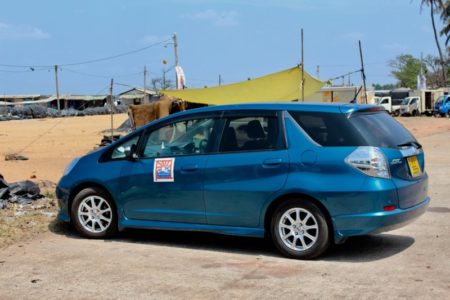
Driving from Colombo to Kalpitiya: our car and driver
Lunch in a Negombo Hotel

Dessert plate
We took a buffet lunch right on Negombo Beach, in the Goldi Sands Hotel. I didn’t really think about using hotel lunches before, it was our travel agency that found that out for us. Hotel lunches on the road in countries like Sri Lanka are a very good idea. The lunch is very different from what you get in roadside eateries and in hotels you also get a relaxed air conditioned break.
We sat a long while gazing at the beach and as always I first remembered my camera when we had almost finished and it was dessert time.

Sri Lanka’s west coast: Negombo beach
I felt I could stay here for the rest of the day, on soft Negombo sands or maybe by the pool. What could be a better way to spend Sri Lanka’s National Day than enjoying what the country’s nature offers? But there was another beach and pool to come and we were looking forward to that.
Our destination was Kalpitiya and the amazing Villa Kalpitiya that you will see after a while.

Goldi Sands Hotel pool, Negombo
But this hotel too looked very good in all respects and the buffet lunch was delicious. And we drank a lot of sparkling water which you need to do in a hot climate. Sparkling or not, you need water.
Contact information of Goldi Sands Hotel, Negombo
Negombo to Kalpitiya

Drive from Negombo to Kalpitiya, rice fields
After Negombo we finally got to the countryside and saw more of Sri Lanka’s tropical nature, for which was what we came to this country!
Pure, green nature all the way on roadsides: rice fields and coconut plantations. We now passed less villages but all villages we went through had a temple or church, or many of them. And those west coast temples are so beautiful!

From Colombo to Kaliptiya, coconut plantations

Temples on Sri Lanka’s west coast: a Hindu temple

A Hindu temple peackock

A Hindu temple monkey

A peacock gate

West coast Christian church

A Sri Lankan Buddhist shrine

Hindu temples have elephant heads

Is this Hindu or maybe Buddhist shrine?
The Kalpitiya Peninsula

From Colombo to Kalpitiya: Kalpitiya beach and coconut palms
Then we reached the peninsula! The Kalpitiya Peninsula is a long, narrow strip of land between the Indian Ocean and Puttalam Lagoon. Unspoilt, white, sheltered beaches backed by coconut groves, wherever you look and on both sides of the road. Why did we get here first now?

Cow in traffic in Kalpitiya village
And first now we are meeting cows, a lot of them, on rice fields, between coconut trees and on the roads. The walk without chains and don’t care about cars and they just stop where they want. But we are on holiday and there’s no reason to hurry…

Cows on the road!

Kalpitiya cow in strong equator sunlight
Kalpitiya villages have a slow tempo compared to more developed areas. You can tell these people love their peninsula, their palms, beaches and cows and they can take it easy. Kalpitiya is just a perfect tourist destination but still a hidden place. So good that we took and traveled the long distance from Colombo to Kalpitiya!

Kalpitiya village life

Tuk tuk parked on the roadside, Kalpitiya

A biking man and his load

Street food stall
From Colombo to Kalpitiya: Kalpitiya Side Roads

Tuk tuk on a Kalpitiya road
Finding our accommodation was not easy. Not even our driver had been to this specific place before and we got a bit lost on the bumpy dirt roads that were not the least planned for cars.
So we were driving very slowly and to save the car getting off and walking outside the car where it was the most bumpy – and all tuk tuks did it much better! Probably the locals already know where the worst holes are.

Dirt road in Kalpitiya

Cow fence, Kalpitiya
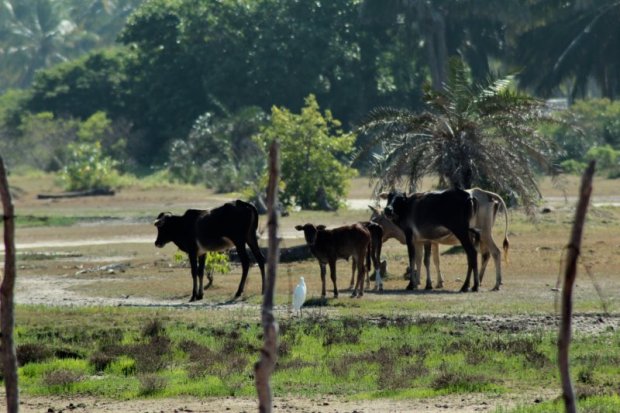
Cows by the lagoon

Fishing huts used for drying salt

Kalpitya fisherman with his nets

Sorting out fishing nets
Then finally we found the right place. We followed these white roadside stones – to our booked accommodation the Villa Kalpitiya. What a villa!
Road to the Villa Kalpitiya
The Villa Kalpityia
It was not a hotel but rather a country house, cottage or villa, but so different from what we normally have in my country and in our climate.
Blue and green window shutters, thatched palm roof made of local materials, outdoor living and dining rooms, a sandy garden with a pool and a sandy beach. What more can you demand, we had found a little paradise.

Our colorful window shutters

The Villa Kalpitiya pool

Pool backed by white wall

A house with coconut leaf roof

Coconut leaf roof and bougainvilleas

Just planted temple flower
Our young hosts Theresa and Udayang were so nice, they met us with a smile and prepared our coffee, dinner and breakfast in their outdoor kitchen and served us to the long table – where we sat alone, with our driver since we happened to be the only guests that particular night.
They had planted temple flowers in the hot sand, you can see one of the plants above.

Our host couple Theresa and Udayang

Open dining room and view to beach

View from upstairs lobby
Sleeping Partly Outdoors
What about our room then? All rooms were like in a side building, with doors to a sandy patio. Unlike the public areas our room had all four walls which made me happy. There was a roof too, but all construction was very airy and there was no way to prevent mosquitoes from coming in. In addition the bathroom had no roof where the shower was – so the bathroom was partly outdoors.
Knowing what mosquitoes spread in tropics I was so worried but there were the solutions: proper evening clothing, mosquito spray and above all mosquito nets. These solutions totally saved us from those hungry insects.
I never tried a mosquito net before and was worried if I can sleep at all but I managed it and would certainly do it again. Next summer going to my country cottage in Finland I’ll bring a mosquito net and sleep well.

Villa Kalpitiya rooms

Night spent inside mosquito nets

Bathroom with both natural and man made rain shower

Pool at sunset

Pool with lights on
We only stayed one night in the Villa Kalpitiya but it’s a place where we definitely would like to stay longer. This is a little paradise on earth and so different from what usual hotels are like. More information on the place on their Facebook page: The Villa Kalpitiya
Our Sri Lanka Round Trip
Our 175 km drive from Colombo to Kalpitiya was the first section on our Sri Lanka round trip.
To travel around the tropical island we used a car and a driver and the total trip duration was two weeks. You can see our whole travel itinerary on this map:
Our Sri Lanka driving itinerary on the map
To learn what the highlights of Sri Lanka are and how our trip was arranged check out this post: What to See in Sri Lanka and how to tour the Island.
Our Sri Lanka road trip was made in cooperation with the Sri Lankan travel agent Connaissance de Ceylan and Theme Resorts & Spas hotel chain, but like always all opinions shared in this blog post are our own.
Next Post: Touring Sri Lanka’s Ancient Cities
In the next post our journey will continue to the jungles. We will see Central Sri Lanka and explore the country’s old capitals, today hidden in the jungle:. Touring Sri Lanka’s Ancient Cities and the Cultural Triangle

An old dagoba in one of Sri Lanka’s ancient cities




